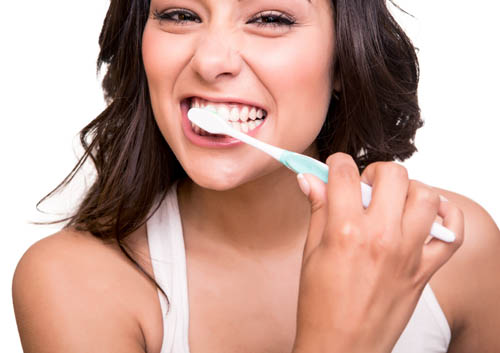Alleviate Tooth Sensitivity
November 12th, 2025

There’s nothing like the simple seasonal pleasures. What’s more enjoyable than a cup of hot apple cider on a blustery winter day, or a tall glass of ice water in the middle of a summer heatwave? Until, that is, tooth sensitivity makes that hot or cold treat no treat at all. If untimely tooth sensitivity is causing you problems, there are solutions we can offer!
Improving Brushing Technique
Careful brushing is a wonderful habit to get into, but sometimes there can be too much of a good thing. Over-energetic brushing can actually damage our enamel. And underneath that enamel is dentin, a more porous substance which allows heat and cold to reach the more sensitive inner tooth.
But, please, don’t give up on brushing! Switching to a soft-bristled or electric toothbrush and a toothpaste designed for sensitive teeth can make a world of difference. Drs. Peter Vogel, Vijal Vadecha can recommend the most effective and safest way to brush, as well as suggest toothpastes designed to fight tooth sensitivity. Until you recover, now is the time to avoid acidic and sugary foods and drinks (which can also bother sensitive teeth) and home tooth-whitening products as well.
Preventing Gum Disease
When gum disease progresses, the gums can begin to pull away from the teeth. This recession exposes part of the root area, which is much more sensitive to heat and cold. Regular checkups and cleanings can keep gum disease from developing. Gum disease that is already present can be treated, and we can discuss whether more intensive care, such as a gum graft, is advisable to protect the root area.
Treating Injuries to the Tooth
If you have a cavity, a fracture, or another injury to the tooth or nerve, sensitivity is a good sign that you should call us right away. And, sensitivity is a symptom that can disappear when we restore the compromised tooth, whether it requires a new or replacement filling, a crown, or a root canal. If your teeth are more sensitive as a result of tooth grinding or other orthodontic problems, we can identify those issues as well.
No matter the reason for your tooth sensitivity, we want to work with you to find out the cause of the problem and to find a solution for it. Call our Anthem office if you notice any unpleasant or painful reactions to temperature, foods or even wind and air. Whether it’s advice on correcting your brushing style or treating tooth and gum conditions, we are here to help you.
National Brush Day
November 5th, 2025

October 31—Halloween. Fourth Thursday in November—Thanksgiving. And, in between these two favorite autumn holidays, we have November 1—National Brush Day!
Okay, okay. Maybe National Brush Day isn’t quite as well-known as Halloween or Thanksgiving, but we take any opportunity to celebrate your dental health. So, let’s celebrate brushing!
After all, brushing is vital for healthy teeth and gums.
- Brushing is your first line of defense against plaque. Plaque forms all day long. Plaque sticks to your teeth. Plaque is filled with bacteria which produce cavity-causing acids. Brushing regularly means plaque won’t stay on your teeth long enough to cause serious tooth decay.
- Brushing is also important for your gum health. Angling your brush to carefully clean plaque and bacteria away from your gum line helps prevent gum disease.
- Tooth decay is the most common chronic disease among children and young adults. The leading cause of tooth loss in adults is gum disease. Good brushing habits help prevent tooth decay and gum disease—a win/win when it comes to your oral health.
To make the most of the time you spend brushing, let’s take a moment to review some basics on National Brush Day.
Are You Brushing Correctly?
- Big, broad brushstrokes aren’t the answer. Instead, use small up-and-down or circular strokes over each tooth and each tooth surface—outside, inside, and on the flat surfaces of your molars.
- Because plaque forms all day, you need to keep on top of it. Brushing at least twice a day for two minutes each time is a good general rule. Drs. Peter Vogel, Vijal Vadecha will let you know the best brushing schedule for your individual needs.
- Brushes are meant to clean, not to scrub. You don’t need a heavy hand for cleaner teeth.
- Which also means, there’s almost never a good time to brush with a hard-bristled brush. Hard bristles, along with hard brushing, can actually damage your enamel and gum tissue. Stick to a soft-bristled brush for dental TLC.
Are You Taking Care of Your Brush?
- To clean away bacteria and viruses you might have picked up during the day, wash your hands before brushing and flossing.
- Shake your brush dry when you’re finished and then let it air dry upright with the handle pointing down. Only use a case for travel, and make sure it has air holes for ventilation. (Bacteria thrive in a wet environment.)
- If your toothbrush lives in the bathroom, close the toilet seat before flushing to avoid airborne particles.
- No matter how close you are to your family members or roommates, don’t share your toothbrush. Sharing doesn’t mean caring in this case—it means sharing germs. Your brush should keep a healthy distance from other brushes as well.
- And no matter how fond you are of your brush, be prepared to replace it often! Most brushes last three to four months at best, because bristles start to fray and can’t clean effectively after several months of use.
It’s no coincidence that National Brush Day comes right after Halloween, the most sugar-filled holiday of them all. So, how can we mark the occasion?
Treat yourself to a new toothbrush! Take a moment to review your brushing habits. If you have young children at home, spend two minutes brushing together to make sure they’re brushing effectively–they might even have some tips for you! Brushing your teeth properly is one of the easiest things you can do to protect your oral health. That’s something to celebrate!
Courting Disaster
October 29th, 2025

When we think of sports and dental damage, we naturally think of hockey and football. But when it comes to the actual number of dental injuries suffered each year, vying for top seed is the game of basketball.
How is this possible? After all, football and hockey are categorized as “collision sports”! But along with the helmets, shin guards, and padding, these teams often require mouthguards—and this makes all the difference. Studies have shown that an increase in the number of players wearing mouthguards means a decrease in the number of oral traumas.
And while basketball isn’t considered a collision sport, it is a contact sport. Basketball is a combination of running, jumping, hard surfaces, and solid bodies. And elbows. We can’t forget elbows. So a broken or even a knocked out tooth isn’t, unfortunately, all that unusual when bodies in motion meet hard surfaces—or other players. But there are other dental dangers as well. Besides tooth injuries, oral injuries can involve:
- The ligaments and bone structures holding teeth in place
- Bones in the upper and lower jaw
- Delicate gum, tongue, and mouth tissue.
You need a solid defensive strategy to reduce the severity of oral injuries or to prevent them from happening altogether. The best play in your playbook? Wearing a mouthguard!
Choosing the right guard is key. There are three common options, and you can choose the model which works best for you:
- Stock guards, which are ready-made guards in pre-formed shapes and sizes. You can buy them over the counter in drug stores and sporting goods stores. Because these guards aren’t shaped to fit your teeth and mouth specifically, they can be less protective (and harder to speak around).
- “Boil-and-bite” guards can also be purchased, and can provide a closer fit. After warming the guard in hot water as directed, you place it in your mouth and bite down firmly to mold it to your teeth.
- Drs. Peter Vogel, Vijal Vadecha can make you a mouthguard which is designed and crafted specifically for your use. Because this guard is custom-fitted, it provides better protection for your teeth and mouth. Patients often find custom guards much more comfortable and more durable as well.
Mouthguards are most effective when you wear them on the court and care for them off the court. This means avoiding a few flagrant fouls.
- Dirty play
All those moist nooks and crannies inside your mouthguard are a perfect environment for bacteria, mold, and plaque buildup. You should clean your mouthguard carefully every time you wear it, and let it air dry before popping it back in the case. Ask Drs. Peter Vogel, Vijal Vadecha for advice on getting your guard and its case their cleanest.
- Failure to sub out in a timely fashion
Mouthguards don’t work if they’re damaged. If you notice any warping, breakage, or jagged or sharp edges, contact our Anthem office for a replacement. If a guard doesn’t fit you properly, it doesn’t protect you, and sharp edges can irritate or injure delicate mouth tissue.
- Unnecessary roughness
Your mouthguard protects you, so don’t forget to protect it! Keep your guard in its case when you’re not wearing it to save it from dirt, damage, and disappearance.
If you know your basketball, you know your guard game can make all the difference. Even though a mouthguard might not be mandatory on your team, that doesn’t mean it’s not essential. Remember that basketball is a contact sport, and protect yourself with a mouthguard whenever you play.
Proper Brushing Techniques
October 22nd, 2025

Brushing your teeth properly removes the food particles and bacteria that can lead to tooth decay and gum disease. However, you do not want to scrub your teeth or gums heavily. A heavy hand can lead to tooth and gum erosion, as Drs. Peter Vogel, Vijal Vadecha and our staff see all too often.
You should also use a soft bristle toothbrush to avoid damaging the surface of your teeth. Make sure the head of the brush fits in your mouth, because if it is too large you will not be able to reach all tooth surfaces. Follow these steps to ensure you are brushing properly.
- Use a small amount of toothpaste on your brush. The recommendation is a pea-sized amount or thin strip on the bristles.
- Hold your toothbrush at a 45-degree angle to the surface of your teeth, angling towards your gums. Use a circular motion on all exterior tooth surfaces, and avoid back-and-forth “scrub” brushing.
- Once you have cleaned the outer surfaces, hold the brush vertically and clean the inner teeth surfaces — the side of your teeth that face your tongue. Do not forget the inner surfaces of your front teeth.
- Finally, finish by cleaning all the chewing surfaces of your teeth. You need to maintain a gentle touch, but make sure you get into the full depth of your molars. The entire process should take about two minutes.
Drs. Peter Vogel, Vijal Vadecha and our staff recommend changing your toothbrush every three to four months for best results. Do not forget to clean your tongue, which helps remove excess bacteria from your mouth. Special brushes are available just for cleaning your tongue, and they are easy to use.
Proper care of your teeth also requires flossing on a regular basis. Flossing can be performed before or after you brush. Following up with a quality mouthwash will provide you with even more protection. Do not be afraid to ask the Daisy Mountain Dentistry team for tips on proper brushing and flossing.


